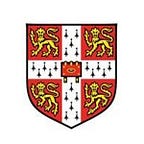The Egyptian geneticist exploring the fragile early life of mammalian eggs
In the last ten years Ahmed Balboula and his young family have lived in three different countries as he’s pursued a career in reproductive genetics. His current research looks at the role of genes in determining success rates in fertilisation — and why things go wrong.
Life is an adventure. When I arrived in the UK last year, flying over from Egypt, I hired a car at Heathrow airport. I was moving here with my family and came ahead with our heavy luggage. Within a week, I accumulated almost £500 of fines. Because my GPS was out of date I exceeded the speed limit through roadworks on the A14. I also parked in various places where it’s not allowed.
My wife and I joke that our hobby is moving countries. In the past ten years we’ve lived in Japan and the USA as well as in our homeland of Egypt. Our oldest daughter was born in Egypt, the middle one in Japan and the youngest in the USA. We’re here for two years and we’re happy that the girls are getting a good education at state schools in Cambridge.
I trained to be a vet and then went into research. My interest in science started when I was about eight. We had a wonderful teacher called Mr Atif. He set the class weekly tests. You only got the top mark if you were the fastest and got all the questions right. At home, I read an Arabic children’s magazine with a science section that told you about inventions.
I stayed on at my university and worked as a demonstrator. Meanwhile I started to read scientific papers in English and look at where these brilliant scientists came from. It was my dream to become one of them — and I began to improve my English listening and speaking skills as a first step.
As a vet student I’d specialised in animal reproduction. The livestock industry strives to produce animals with superior genetic properties. We can achieve this by using embryos produced in vitro (test tube) from genetically-superior animals. However, the success rate of in vitro embryo production remains low. To address this problem, we need to understand the molecular mechanisms that regulate the quality of pre-implantation embryos.
I made contact with a Japanese professor who is an expert in in vitro fertilisation. We began a detailed correspondence about his work. He and my Egyptian supervisor helped me to organise funding and I went to Japan to take a PhD.
My Japanese supervisor was incredibly kind. Because I spoke no Japanese, I relied on him for absolutely everything. Luckily life in Japan is highly organised and, after a few months, I found it a relaxing place to live and work. In the lab, I explored ways of improving the quality of pre-implantation cattle embryos by regulating the molecular mechanisms taking place within their cells.
Moving to the USA was another challenge — but at least I could communicate. I worked at the University of Pennsylvania in Philadelphia and Rutgers University in New Jersey. During my stay in USA, I expanded my scientific network and discovered the roles that different genes play in regulating how egg cells mature in preparation for fertilisation.
The offer of a position in David Glover’s group at Cambridge was just amazing. He’s known all over the world for his discoveries of how cells reproduce. My Marie Sklodowska-Curie Fellowship allows me to explore the molecular mechanisms which determine successful reproduction.
Most miscarriages in mammals are caused by abnormalities on the female side. These occur in the egg at an early stage — well before fertilisation and implantation. Using the mouse as a model system, I hope to solve the puzzle of why mammalian eggs are prone to errors so we can prevent these problems happening.
The opportunities open to visiting researchers at Cambridge are exceptional. I’ve taken personal and professional development programmes as well as research career development programmes — and I go to seminars presented by world-famous scientists.
You can’t get far in science today without a solid grasp of English. I began learning English when I was 11 but I had no idea of how important it would be. Through an exchange scheme organised by Cambridge’s Language Centre, I help students on the University’s Arabic Studies course with their Arabic and they help me with my English.
My wife and I go to a weekly English conversation group. It’s hosted by a British friend. Sitting in her kitchen, with English tea and chocolate biscuits, we practise the words Arabic speakers find difficult to pronounce — such as next and asked. It’s fascinating to watch our children improve their English and acquire the British accent. They now correct us.
Being a Muslim in Cambridge is easier than I thought. You can buy halal food and there’s a mosque where I attend Friday prayers. But I don’t categorise people in terms of religion. I have friends from different countries — some are believers, some aren’t.
I’m quite a shy person. But I’ve pushed myself to engage in Cambridge life by establishing new friendships and joining different activities. My long-term goal is to establish my own research lab and to be able to improve the quality of mammalian eggs and embryos.
